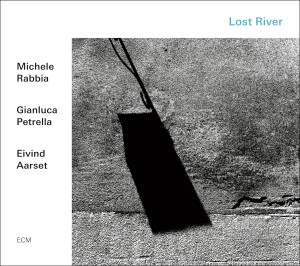 By turns ambient, majestic, contemplative, evocative, even at times unsettling, Lost River by the new trio of drummer Michele Rabbia, guitarist Eivind Aarset and trombonist Gianluca Petrella is a sonic hall of wonders.
By turns ambient, majestic, contemplative, evocative, even at times unsettling, Lost River by the new trio of drummer Michele Rabbia, guitarist Eivind Aarset and trombonist Gianluca Petrella is a sonic hall of wonders.
The album’s 10 tracks, mostly in the five- to six-minute range, explore watery themes through mostly spontaneous improvisation. I find it utterly fascinating, alternately calming and joy-inducing through its wildly creative exploration of sounds and textures.
Although primarily playing percussion, guitar and trombone, all three musicians also contribute other sounds, particularly through electronics. “All three players – Rabbia, Petrella and Aarset – share an interest in electronic music as a means for conveying or enhancing emotional expression and for shaping the environments and atmospheres in which instrumental interaction, melodic development and the coloring of sound can take place,” says the one-sheet from ECM. Those electronics are present from the outset, providing the soundbed for virtually all of these pieces and likely providing inspiration for their improvised flights of fancy.
To me the most moving moments are contributed by Petrella. I knew him previously from his “jazz” work with Enrico Rava, but he’s in a different mode here, although his smooth, full, euphonious tone is recognizable. He provides a majestic welcoming salute on the opening piece, the aptly titled “Nimbus.” This is the silver-lined cloud that presages the water-themed works to come.
The electronics provide deeply layered drones of varying timbres, as in “Flood” where we hear swelling organ-like chords under dry rattling whispers and a plethora of other sounds that include Rabbia’s percussion, Aarset’s floating guitar lines and Petrella’s nearly avian intrusions.
The titles themselves paint a mental picture of these water-influenced works: “What Floats Beneath,” “Lost River,” “Night Sea Journey,” “Flotsam,” “Fluvius,” the latter being Latin for river or stream. That one is as lovely as its name, a flowing and lyrical piece with long languid guitar lines, melodic slow horn progressions, and droning electronic “strings.” “Styx,” for the famous river separating the realms of the living and dead, has an ominous, cavernous horn and synth soundscape at its base, punctuated by wailing guitar tremoloes, giving way to an air of majesty and peace.
“Night Sea Journey” is the album’s fulcrum, the one piece with a recognizable rhythm and even a little bit of swing. A keyboard and guitar provide forward momentum of this journey, into which the horn and drums edge with mysterious sounds interspersed at unpredictable intervals. At the other end of the sonic spectrum are the dry whispers and rustlings of electronica that typify “What Floats Beneath” and provide a base for Aarset’s peaceful chording as on a Spanish guitar. It’s an ambient soundscape that reminds me of early Calexico, in fact.
As the album winds down it becomes more esoteric: the crackling dripping soundscape of “What The Water Brings” which builds to a deep and affecting cascade of thunderous drones; the unsettling, Subotnick-like electronica of “Flotsam,” and finally the dry, dessicated scape of “Wadi,” complete with insectoid whining, shimmering heat waves, and stacked chords of horn, guitar and perhaps something like a vocoder.
It’s an entertaining challenge to try and decipher the bits and pieces that shape and form these sound collages and tone poems. What’s an “instrument” and what’s “electronics?” Ultimately, though, more is gained by eschewing analysis as you let this Lost River wash over you.
(ECM, 2019)
